The High Cost of Becoming a Regional Head
A number of regional head candidates spent billions of rupiah in the 2024 elections. The elections were rife with money politics.
maaf email atau password anda salah

A number of regional head candidates spent billions of rupiah in the 2024 elections. The elections were rife with money politics.
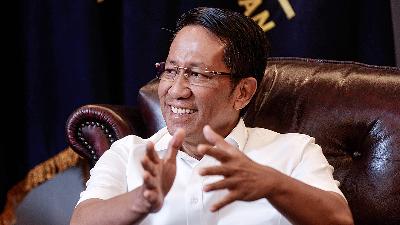
Supratman Andi Agtas explains President Prabowo’s idea to hold indirect regional elections or Pilkada.

Illegal mining exacerbates the critical condition of the upstream Batanghari River Basin Area (DAS). The fraudulent practices involve many actors.
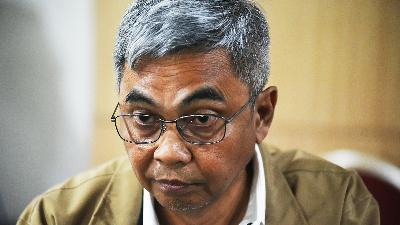
KPK’s new chief, Setyo Budiyanto, is confident in tackling investigation and prosecution challenges and determined to unite all staff under his leadership.
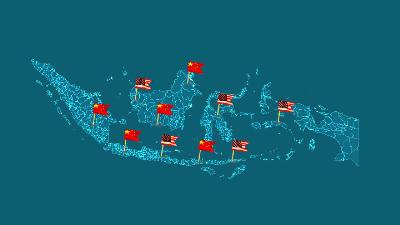
The trade war between the US and China is poised to create significant challenges for the global economy. However, the Indonesian government appears indifferent.

Indonesia still lags behind other countries that already implemented free school lunch programs.

A subsidiary of the peer-to-peer lending platform KoinWorks falls victim to an alleged fraud, resulting in a loss of Rp365 billion. Lenders are now threatening legal action.

The regulation on determining lake boundaries begins to be executed. It reduces repurposing and state losses resulting from the loss of lakes.
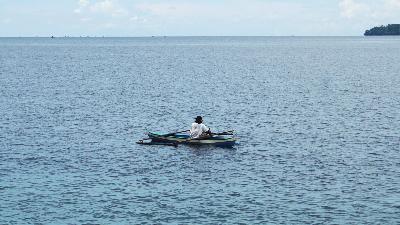
In Maluku, the sasi tradition is also applied to various natural resources to ensure their sustainability and quality.
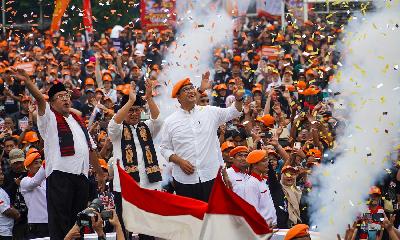
Pramono Anung successfully secured Anies Baswedan’s support in the Jakarta gubernatorial election. There seems to be a political deal ahead of 2029.
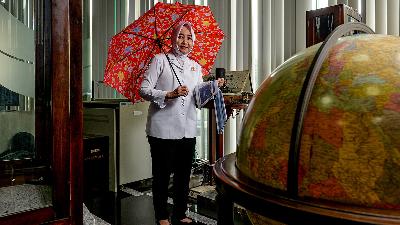
BMKG Chief Dwikorita Karnawati on the extreme weather phenomenon triggered by environmental destruction and the potential for megathrust earthquakes.

Cartoon: Yuyun Nurrachman

Prabowo Subianto intends to place Bulog under the president’s control, changing its autonomous status and eliminating its commercial functions.

The government writes off non-performing loans of fishermen and small business owners. Detailed criteria can prevent moral hazards.

The Communication and Digital Affairs Ministry is tidying up house now that 10 of its employees are accused of participating in online gambling. Their flow of cash is being scrutinized.

We launch Tempo single brand, with news products integrated under one platform. Scores of new services will be offered.

There are many irregularities in relation to the detention of Tom Lembong. Without sufficient evidence of corruption, this case can be considered as politicization, and not enforcement, of the law.

The position of BRIN remains uncertain under Prabowo Subianto’s administration. The restructuring of the research agency is hampered by political interests.
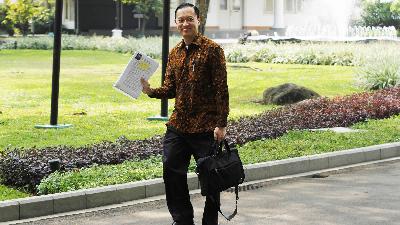
Tom Lembong owns assets worth Rp101 billion but does not own a house. He does not live with his wife and children in Jakarta.

BI faces a dilemma over cutting rates amid the global volatility stirred by Trump’s victory.
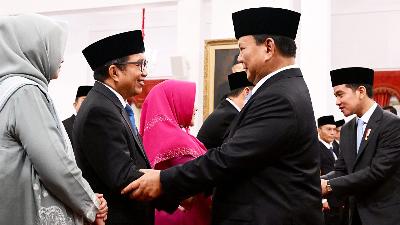
Prabowo Subianto is establishing BPI Danantara to manage state-owned enterprises. There are reportedly tug-of-wars and a number of obstacles in the process, including the obligation to revise laws.

Ridwan Kamil should have realized from the start that the parties supporting him were not being sincere. The people will lose out.

The three judges who acquitted Ronald Tannur often reported for ethics violations. Their bank accounts show transactions amounting to the billions.
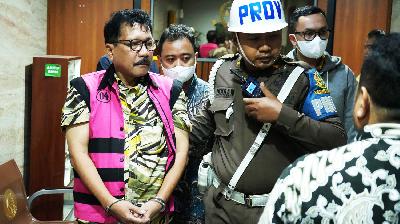
The Rp920 billion found in Zarof Ricar’s house is suspected of being related to arranging court case verdicts. The Corruption Eradication Commission once detected his corrupt exploits.

Interviews with Industry Minister Agus Gumiwang Kartasasmita and Sritex President Commissioner Iwan Setiawan Lukminto on the company’s bailout.

Capital outflow becomes increasingly clear at the outset of Prabowo’s administration. The large cabinet undermines investors’ confidence.

Jokowi’s son-in-law, Bobby Nasution is caught up in alleged bribery involving a mining permit in North Maluku. He is accused of selling his influence.
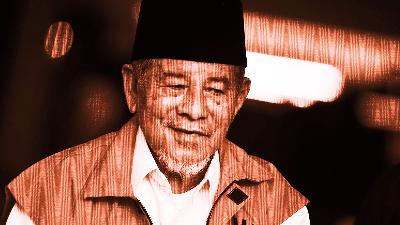
The term “Medan Block” emerged during the trial of former North Maluku Governor, Abdul Gani Kasuba. Medan Block is believed to refer to pre-allocated nickel mining concessions in Halmahera.

Bobby Nasution is suspected of managing the Medan Block nickel mine since 2021. He met with Abdul Gani Kasuba before becoming the Mayor of Medan.

Driven by corporate demand, helicopter business opportunities continue to grow. Operators are increasingly expanding their fleets.
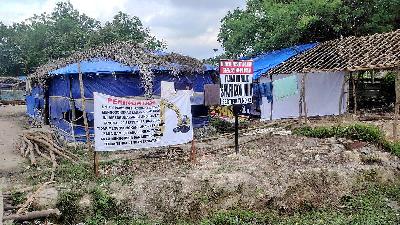
The Rohingya refugees living in Pekanbaru have more freedom to move around and reside in lodgings. Their children can also attend school.

There is an increasingly real threat to Indonesia’s biodiversity. It cannot be overcome through empty slogans at international forums.

The Joko Widodo administration leaves a heavy burden for state-owned enterprises. Many projects result in big debts.

Prabowo Subianto formed a large cabinet to accommodate the interests of parties, businessmen, and his supporters. Mining entrepreneur Haji Isam is suspected of proposing several ministerial candidates.

The Stock Exchange detects alleged violations in the IPO of Barito Renewables Energy. There are indications of maneuvering around public shareholding requirements.
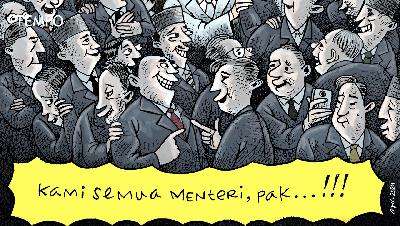
Cartoon: Yuyun Nurrachman

Indonesia’s delegation at COP16 CBD in Cali, Colombia, is not led by a minister. Biodiversity funding is at risk of not being agreed upon.

Empathy is the key to happiness. We are happy when we help others, we are happy when we do good.

The KPK uncovered alleged embezzlement of the Taspen pension fund involving Sinarmas Sekuritas. The result of poor supervision by the OJK.

The family members of some ministers enter the fishery business. Other problems, such as the activity of illegal foreign vessels and the abuse of crew members, still prevail.

Explanations from State Secretary Minister Pratikno and Maritime Affairs and Fisheries Ministry on fishery business and the case of illegal ships in eastern Indonesia.

Minister Sakti Wahyu Trenggono revives a shutdown port. There is indication that the minister’s son is involved in the fisheries business.
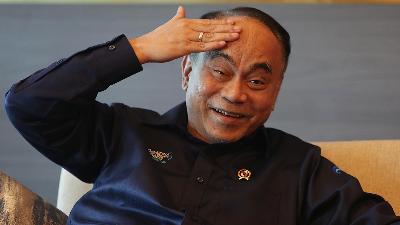
Tempo’s interview with Minister of Communication and Informatics Budi Arie Setiadi about Jokowi’s campaign before the end of his tenure.

Jakarta's regulations were considered as failing to fulfill the aspirations of differently-abled people
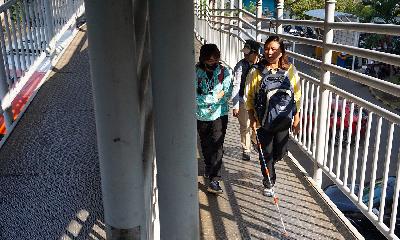
Tempo accompanied several differently-abled people as they navigated public transportation in Jakarta.

Instead of paying its debts, the Bakrie Group is suing 12 creditors. This could become a bad precedent for the investment climate.
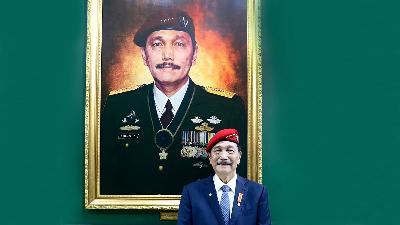
Luhut explains his close ties with Jokowi, and the plans of the president-elect Prabowo. This is his first interview with Tempo after the one on the Panama Papers eight years ago.

VIVA Group is facing a restructuring process under a debt payment suspension scheme and is threatened with bankruptcy. There are maneuvers to lobby creditors and reduce debt.
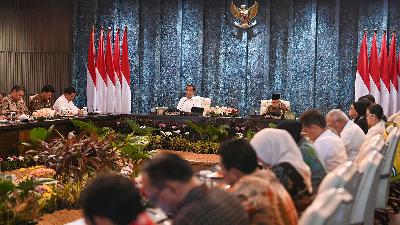
Jokowi is preparing for the incoming Prabowo-Gibran administration starting in late February 2024. He hopes that Prabowo can continue his programs.

The police arrested a drug baron who was operating from inside a prison. It is a chronic problem that remains unsolved.

The partnership between Riau regional company and Kingswood Capital Ltd resulted in criminal charges, with two top executives now facing allegations of embezzlement.
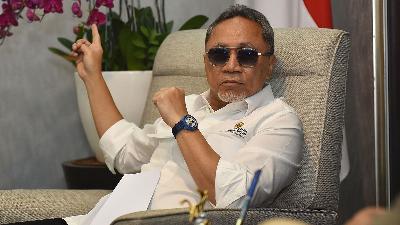
Trade Minister Zulkifli Hasan on the issues ranging from sea sand export policy to Prabowo Subianto’s bureaucratic management style.

Dozens of companies are seeking permits to process marine sediment. They include businessmen, regional head candidates, and former cabinet ministers.

The hand of the government is apparent in Kadin’s internal conflict between Arsjad Rasjid and Anindya Bakrie. This has no effect on the public.

KPK officials are inconsistent in their explanations of the Bank BJB corruption case. There are indications of collusion with the government.

The KPK named five suspects in the Bank BJB advertising budget corruption, but it has yet to implicate high-ranking officials in the West Java Provincial Administration.

Anindya Bakrie ousts Arsjad Rasjid from the position of General Chair of the Indonesian Chamber of Commerce and Industry (Kadin). The Palace’s support shifted.
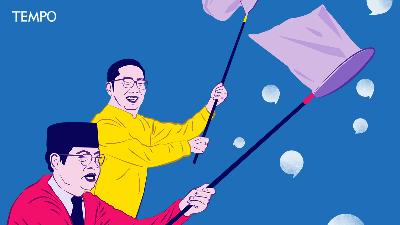
Gubernatorial candidates are trying to win over the votes of Anies Baswedan supporters in the Jakarta regional election. Jokowi reportedly shifted his support.
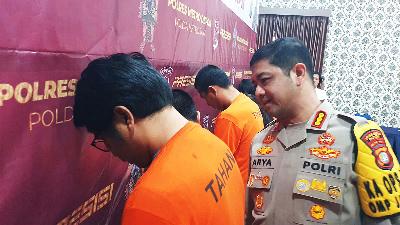
Police uncover baby trafficking syndicate operating in Java-Bali since 2023. Five babies were already sold.
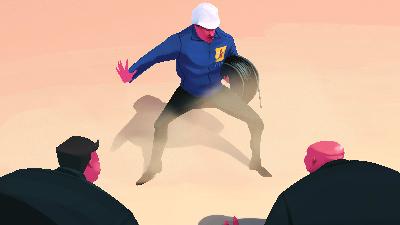
Articles on power wheeling prevent the legislation of a New and Renewable Energy Bill. State electricity company PLN’s unique position could be left precarious.
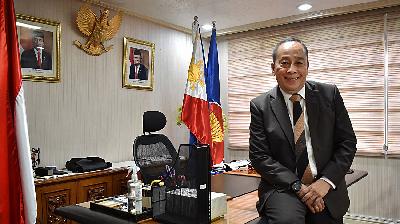
Former Governor of the National Resilience Institute and Indonesian Ambassador to the Philippines, Agus Widjojo, on the revision of the Indonesian Military Law.

The culinary businesses of Gibran Rakabuming and Kaesang Pangarep are fading. This seems to contradict their massive financing.
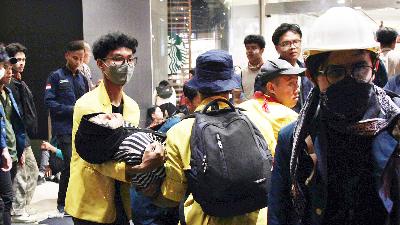
Violence broke out as police attempted to disperse a demonstration in Central Java. The use of tear gas needs evaluation.
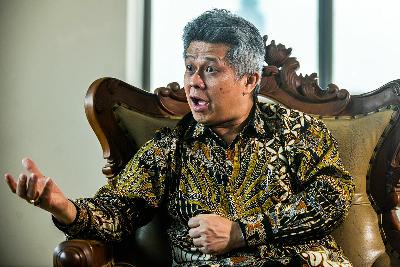
Chair of the Presidium of the Indonesian Bishops' Conference (KWI) Monsignor Antonius Subianto Bunjamin spoke about the preparations for Pope Francis’ visit.
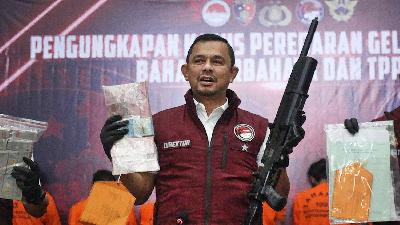
The trial of the defendants in the tin corruption case revealed the involvement of Brig. Gen. Mukti Juharsa. He evaded scrutiny from the Attorney General’s Office.
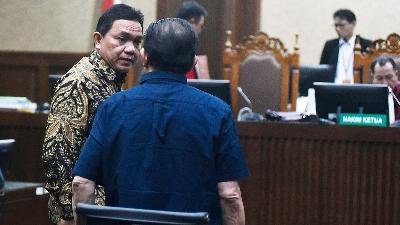
The selection process for BPK members is under scrutiny following multiple instances of its leaders being implicated in corruption cases. The selection process is deemed to be lax.

Commission XI of the House of Representatives will elect five BPK members. Several political parties are forming a coalition to support their strongest candidates.

The police continue to resort to brutality to silence demonstrators. This is a violation of human rights.

Several political parties conspired to approve candidates for the Supreme Audit Agency (BPK) membership. Corrupt candidates could be selected.

The Indonesia Onward Coalition failed to materialize the ‘empty box’ scenario in several regions in the 2024 regional head elections. Some coalition members have jumped ship.

The 2025 State Budget’s Financial Note illustrates Prabowo Subianto’s financial policies. There is hope for economic improvements.

Prabowo Subianto has nothing to gain by supporting Jokowi’s reckless destruction of democracy. It will be a burden for his administration.
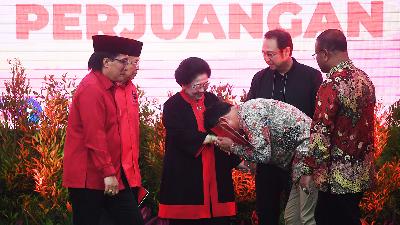
The PDI-P will be nominating Anies Baswedan in the Jakarta gubernatorial election. A popular candidate against Jokowi’s coalition.

Jokowi is believed to have intervened in making Bahlil Lahadalia general chairperson of the Golkar Party.

The trial of the free nutritious meal program involves military personnel and private parties. Authorities manage everything from communal kitchens to food distribution.

The 2025 State Budget accommodates several of Prabowo Subianto’s programs. Lobbying efforts are underway to ensure the smooth implementation of these priority programs.
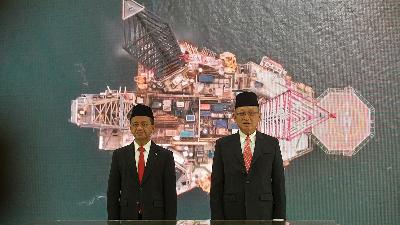
Just months before the end of his term, Jokowi appointed Bahlil Lahadalia as Energy and Mineral Resources Minister. The position is considered prone to conflicts of interest.
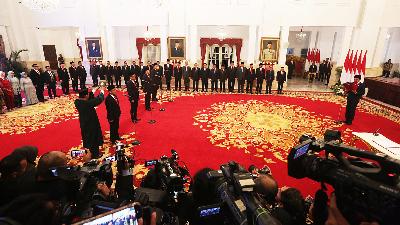
Two months before stepping down, Jokowi reshuffled the cabinet, selecting close allies of Prabowo Subianto.

Cartoon: Yuyun Nurrachman

The opportunity for Anies Baswedan to contest the Jakarta gubernatorial election is slipping away after the coalition of parties supporting him fell apart. There is a guerrilla from the Palace.
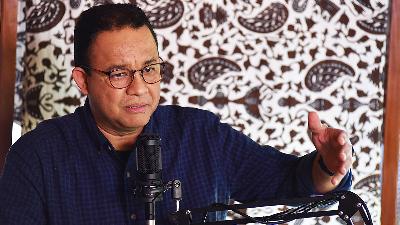
An exclusive Tempo interview with Anies Baswedan regarding his chances to run in the Jakarta regional head election.
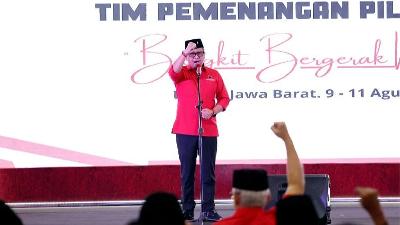
The PDI-P plans to nominate Anies Baswedan in the Jakarta gubernatorial election and is preparing to face candidates supported by Jokowi in other regions.

Jokowi and Prabowo’s coalition are maneuvering to thwart Anies Baswedan’s candidacy in the Jakarta regional head election. Cabinet posts are being offered as inducements.

The government revives plans to impose taxes on sweetened beverages and other food products. There are also plans to implement a color-coded label as a replacement for the tax.

Tommy Hermawan Lo’s name emerges following the mention of Mr. T in online gambling that involves human trafficking case. He is a director at a casino management company.
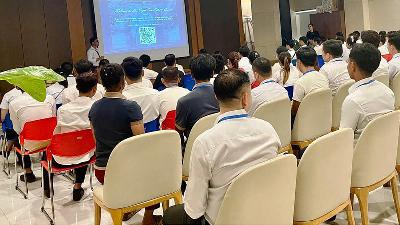
Victims of human trafficking for online gambling and scamming in Cambodia claimed of being forced to work 12-hour shifts and being beaten. Recruitment is still ongoing.

Cartoon: Yuyun Nurrachman
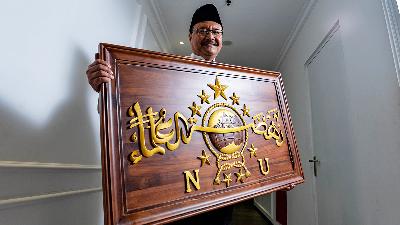
The conflict between the PKB and PBNU escalates following the establishment of the Special Committee for Haj by the DPR. Nahdlatul Ulama feels the DPR is targeting the Religious Affairs Minister, the younger brother of the PBNU General Chair.

The financial market optimism on the Fed’s stance is beginning to falter. There are indications that Donald Trump will influence the Fed’s independence.

Megawati Soekarnoputri is upset over legal cases and election obstructions of her cadres. Political differences heighten her conflict with Jokowi.
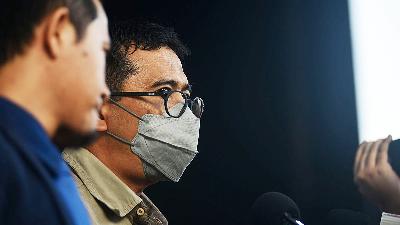
Personal protective equipment corruption suspect, Budi Sylvana, denied inflicting up to Rp300 billion of losses to the state. He revealed the roles of other officials in the case.
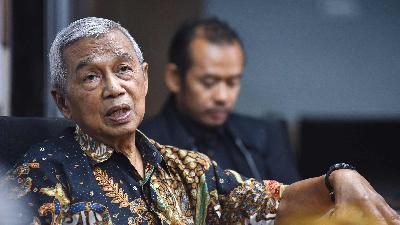
Muhammadiyah accepts the government’s mining concession offer. Many members are against it. Busyro Muqoddas, Chair of Muhammadiyah’s Law and Human Rights Council explains.
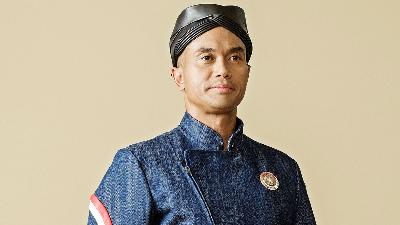
Chair of the Indonesian contingent, Anindya Bakrie, explains the team’s medal target in the Paris 2024 Olympics.

Aoka bread producer’s right of reply to readers’ impressions after reading Tempo’s special edition of 10 years of Jokowi.

Two bread brands, Aoka and Okko, are suspected of using dangerous preservatives. The response from the BPOM is worrying.
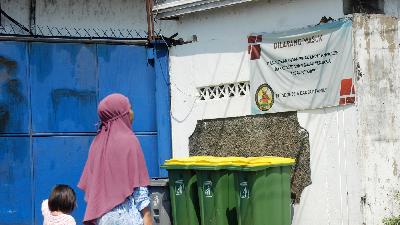
Producers of Okko and Aoka breads suspect elements of business competition.
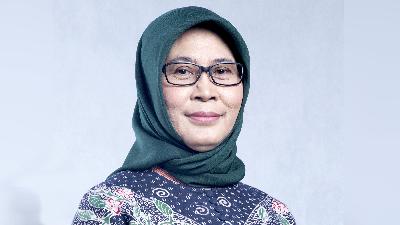
The BPOM does not approve the use of sodium dehydroacetate as a food ingredient. Emma Setyawati, acting Deputy for the Supervision of Processed Foods at BPOM explains.

Two bread brands are suspected of using a type of preservative that is not allowed in food. It is believed as a way to attack small and medium-scale bread producers.

The presence of Okko and Aoka disturbs home-industry breads produced by micro, small and medium businesses.
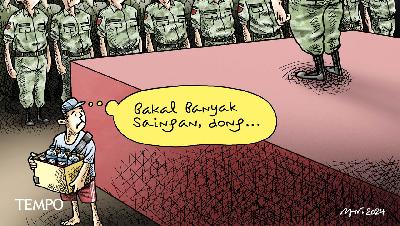
Cartoon: Yuyun Nurrachman

Solidarity appears sporadically in the midst of an explosion in the numbers of Covid-19 cases. It needs to be supported with examples of cooperation among the elites.

ONE of just a few examples of good news from this Corona pandemic is the flourishing of solidarity everywhere.

Opera Gandari by Tony Prabowo was performed for the third time. Director Melati Suryodarmo gave a new interpretation imbued with her personal experience as a woman.

One mother who is never celebrated is Gandari. She was on the losing side, and is despised.

The population of bidadari (Standardwing) birds, the mascot of North Maluku, is gradually restored. A group of young bird lovers in Halmahera plays a major role.

Punakawan servants without Bagong? That is what happened recently in a Sriwedari Wayang Orang stage performance in Solo. The traditional art form is now hovering between life and death.

Members of the Sriwedari Javanese troupe are facing quiet nights, with only a dozen or so people arriving each night to watch their performance. Solo-based Balekambang Ketoprak group, which performs historical Javanese drama, is in a similarly miserable condition. To cover living expenses, its members are forced to take side jobs. Some even become pedicab drivers. A breakthrough is needed to bring back the glory of traditional arts. Quite a challenge, given the heavy burden of daily life that can get the better of the creativity and energy of these groups.

The Bandung District Court sentences four erotic dancers. The Pornography Law is now being reviewed by the Constitutional Court.

Established to provide an opportunity to obtain loans, Danantara could sink Indonesia into a debt quagmire. Risk mitigation is key.
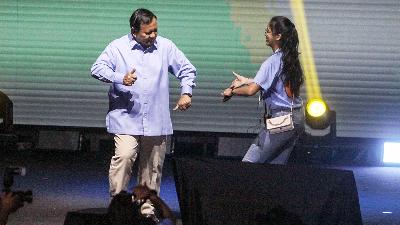
The gemoy dance is quite popular among young people. The campaign team for Prabowo-Gibran brings together many influencers to gather support.
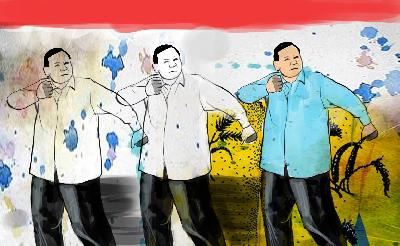
In the “jogetin aja” political campaign, all criticisms are swept under the dance floor. What human rights violations? Just dance it off. Ethics? Ethics your head.

Both banning and forcing schoolgirls to wear hijab are dangerous to the social system in Indonesia. This could strengthen identity politics.

Forcing economic growth in such volatile conditions is a dangerous policy. It is akin to driving a bus through a hailstorm. As long as it does not slow down immediately, the bus is at risk of crashing anytime.
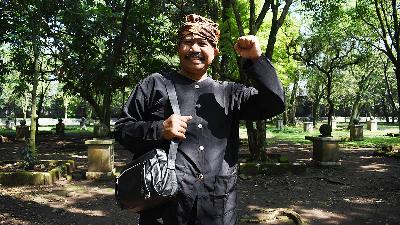
Indonesian Village Administration Association Chair Arifin Abdul Majid expresses his concern about a village association national gathering during which the much-debated presidential term extension was promoted. He warns against the dangers of village officials getting involved in politics.
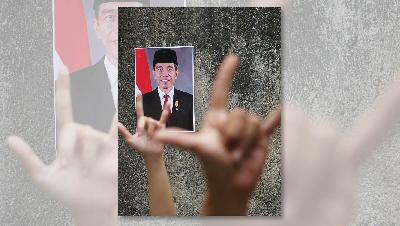
The “Jokowi three terms” movement is dangerous for our democracy. It must be stopped before it spreads.
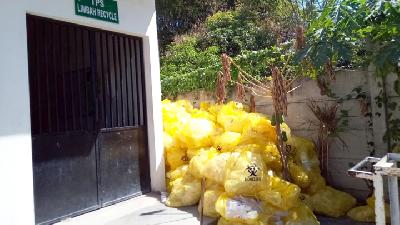
There are problems with the entire management process for hazardous and toxic waste from hospitals in East Java. It is endangering public health.

IN connection with the letter from Mr Andreas I.W. on letter page last week titled Danamon and Unkept Promises, we have contacted the person concerned to provide an explanation. T

Danarto died the night of April 11, 2018, a few hours after he was hit by a motorbike in heavy traffic at south Tangerang, as he was walking.

Danarto wished to eliminate strict barriers between art forms and to create text that strained and pushed against itself, while functioning as a unit.

Minister Tjahjo Kumolo has issued some controversial decisions. This could endanger democracy.

Unlike her previous album, Singer Danilla Riyadi's new album Lintasan Waktu, or Across Time, is both gloomy and poignant.

Indonesia is home to 1.6 million children with special needs, according to the Ministry of Education and Culture's estimate. Many of these children are robbed of the chance to enjoy the full range of opportunities that should be available to them, both due to the lack of access to special needs education as well as the limited range of activities offered to them. These unfortunate conditions motivated a couple in Denpasar, Bali, to establish Sandi Muni Kumara, a dance studio dedicated for deaf children. In Mataram, the Chantiqa Dance Studio offers a class for children with disabilities. Tempo English reports in commemoration of National Children's Day, July 23.

The government has overreacted by issuing Government Regulation in Lieu of Law (Perppu) No. 2/2017. This regulation, which allows for the banning of organizations seen as being at odds with the Pancasila state philosophy or the 1945 Constitution, endangers democracy. Many non-government organizations, not only the hardline Islamist Hizbut Tahrir Indonesia (HTI), can become the potential target. Moreover, there was no need to issue this Perppu in the first place because the banning of organizations is already covered by Law No. 17/2013 on Mass Organizations.

Balabala, the second installment in Eko Supriyanto's Jailolo trilogy, recently premiered in Yokohama. The dance was also performed in Belgium and Germany this March.

THE first order Mohammad Ramdhan Pomanto gave to his subordinates after he took office as Makassar's mayor in May 2014, may seem unconventional. Instead of sticking to the usual practice of asking the staff to translate campaign vision and mission statements into programs, the new mayor ordered all civil servants, including neighborhood and hamlet chiefs, to download WhatsApp on their mobile phones.
The mayor, who goes by 'Danny', was not the messaging app's brand ambassador. "I was only looking for a quick and effective communication channel," he explained.

Short-term populist economic policies are increasingly dominating the world. One is protectionism. In his first days in office, US President Donald Trump immediately pulled his country out of the Trans-Pacific Partnership (TPP). Trump also invited Mexico and Canada to meet and reassess the North American Free Trade Agreement (NAFTA).
Indeed, protectionism benefits firms that enjoy the protection. But in the long run, inefficiencies and hidden costs will emerge, and that will rot the economy from the inside out. This is the danger that has economists and analysts around the world wringing their hands.

THE first order Mohammad Ramdhan Pomanto gave to his subordinates after he took office as Makassar's mayor in May 2014, may seem unconventional. Instead of sticking to the usual practice of asking the staff to translate campaign vision and mission statements into programs, the new mayor ordered all civil servants, including neighborhood and hamlet chiefs, to download WhatsApp on their mobile phones.
The mayor, who goes by 'Danny', was not the messaging app's brand ambassador. "I was only looking for a quick and effective communication channel," he explained.

Short-term populist economic policies are increasingly dominating the world. One is protectionism. In his first days in office, US President Donald Trump immediately pulled his country out of the Trans-Pacific Partnership (TPP). Trump also invited Mexico and Canada to meet and reassess the North American Free Trade Agreement (NAFTA).
Indeed, protectionism benefits firms that enjoy the protection. But in the long run, inefficiencies and hidden costs will emerge, and that will rot the economy from the inside out. This is the danger that has economists and analysts around the world wringing their hands.

The visit last week of Denmark's Queen Margarethe II and her husband Prince Henrik to Indonesia is one indication of improving relations between the two countries. Beyond the usual protocols were serious meetings and discussions between Indonesian government and private sector representatives with a Danish delegation 62 business people, the first of such in the 65 years of relations between the two countries.
"Relations between Indonesia and Denmark will change from a cooperation based on development assistance to a commercial or business-based cooperation," said Danish Foreign Minister Kristian Jensen, who was part of the delegation.

Measuring the social and economic development of a country has been done countless times, by means of various accepted formulas. But only in the last decade has the understanding of good governance as the key to effective development been seriously and intensively studied and researched. Based on 40 data sources, and produced by 30 organizations worldwide, since 2002, the Worldwide Governance Indicators have been applied to 200 countries to measure the country's level of governance. This has provided watchdog groups with the necessary tools to monitor policy and initiate reforms, which also helps to immeasurably assess perceptions of corruption among businesses, public officials and politicians. Much of the work can be attributed to Dr. Daniel Kaufmann when the studies were initially conducted at the World Bank Institute, where he worked. For the past two years, Kaufmann has headed the Natural Resources Governance Institute (NRGI), which pioneered the Resource Governance Index to measure the transparency levels of countries in managing their extractive industry. Kaufmann was in Indonesia recently to meet with public figures in government, the business community and members of the local civil society, and to be the keynote speaker at a panel discussion on 'The Impact of Low Oil Prices on Indonesia's Reform Agenda' which was co-organized by the NRGI and Tempo English magazine. He was recently interviewed by journalists Hermien Y Kleden, Sadika Hamid, Gusthida Budiartie dan Edward Stephens from the Tempo Media Group. Excerpts:

BENNY Moerdani asked Teddy Rusdy for a sheet of paper. On the paper he wrote: "Dear Pak Yoga, from now on, the show is mine!-LBM". The intelligence deputy chief for defense and security then asked Teddy, a Defense Ministry (Hankam) Intelligence Staff Officer Assistant VII, to take this message to General Yoga Soegomo, chief of the intelligence coordination agency, at the crisis control center, 400 meters from the DC-10 Sumatra aircraft. It was then the very early hours of Tuesday, March 31, 33 years ago.
The DC-10 Sumatra served as the flying headquarters for Benny Moerdani and the 24 personnel of the Sandi Yudha Force (Kopassandha) command, led by Lt. Col. Sintong Panjaitan. They were getting ready to take back the Woyla DC-9 airplane which, on March 28 had been hijacked to Bangkok's Don Muang Airport, 12 minutes after taking off from Palembang.

On Friday, May 23, at the pendopo (pavilion) of Tejokusuman, Yogyakarta, I witnessed an important event: the reconstruction and documentation of the dance Srimpi Ronggojanur created by Sultan Hamengkubuwono VIII (1921-1939). This was part of a program put on by Taman Budaya Yogyakarta in conjunction with well-known dance association Krida Beksa Wirama.
At 7:20pm, the gamelan (traditional musical ensemble) musicians, dressed in maroon Yogya-style jackets, batik headcloths with a black background and wrapped batik sarung, took their places behind the instruments. Soon after that, the female singers followed, dressed in kebaya (traditional blouses) of the same maroon color and wrapped in long batik skirts and with their hair wound up in buns. At precisely 7:30pm, the gamelan began to play, greeting the guests. "The performance will take more than one hour," said the emcee, who politely asked that the audience turn off all electronic gadgets. Any noise disturbance would force the presenters to repeat the entire dance from the beginning.

AT 5am on Sunday, May 18, choreographer Retno Maruti called me, conveying the sad news of the passing away of ballerina Farida Oetoyo.
Born in Solo, Central Java, on July 7, 1939, Farida studied ballet at the age of eight at the Fine Arts of Movement Studio in Singapore. From 1950 to 1954 she studied at the Royal Academy of Dance in Australia where she gave her first performance at the Albert Hall in Canberra.

Nuri Muliana improved the services of seven village health posts in Dangiang, North Lombok. Also serving as an information center, the health posts is now a place where residents exchange news and ideas.

When the 2014 National Education and Culture convention was held at the start of this month, one of the priority topics of discussion was the need to conserve traditional culture. To be more specific, to preserve the dances representing the wealth of our diverse arts and traditions sadly being neglected by the younger generation. An effort is now underway to financially support and sustain traditional dance studios all over the archipelago to make it more attractive for youths. Tempo English reports on the revival of these studios in Sumbawa, West Sumatra and Central Kalimantan.

The East Java city of Lumajang is looking to patent its unique dancing horse attraction. The price of horses has soared to ridiculous levels.

For the past two decades, tarling dangdut music has been a popular entertainment on the north shores of West Java, especially in Cirebon and Indramayu. This form of music, which merges tarling (guitar and flute), the traditional music of Cirebon, with dangdut music, is known as the public entertainment of choice when harvest season arrives, or during the major months, from May to July.The rise of tarling dangdut, synonymous with its sensual dance moves, has led to the emergence of a number of local superstars with thousands of devoted fans. Shows of this type have further brought about the establishment of hundreds of new tarling groups. Tempo looked into this music phenomenon currently raging in PanturaJava's north coastincluding mystical backstage tales.

The Indonesian Dance Festival in Jakarta treats audiences to a week of performances.

Despite a shortage of funds, dance workshops in Kalimantan are attracting young people to join in the effort to save the Dayak dance.

The Saman Dance of the Gayo people, in danger of extinction, has gained its rightful place on the World Heritage List.

Daniel Sinambela, the former business associate of top graft suspect Muhammad Nazaruddin, is sentenced to jail. Prosecutors however had failed to present Yulianis, a crucial witness in the case who happened to be the bookkeeper and right-hand person of Nazaruddin, the former Democrat Party treasurer.

Mirotos new work is based on the lives of several dancers. He employs an approach using movements previously not thought of.

The broadcasts of TPI are no longer educational, as the television station’s name would suggest. It is now seen more as a channel for dangdut music.

Red birds of paradise are only found on Raja Ampat, West Papua. Their existence is protected by the international conservation union and they are on the list of endangered birds.

The pattern of dormitory school education in Papua produces a series of quality schools for poor, neglected, or uncared-for children. It is developed under the “lucky hands” of Daniel Alexander, who started the model 15 years ago.

Competent, inflexible, and nonpartisan, Daniel can eliminate conflict of interest in this department.

Traditional Sundanese cuisine awaits the discerning diner at Lumbung Padi, a recently opened Jakarta restaurant.

HE came from an upper middle-class family, part of the government bureaucracy in Solo. Towards the end of the 1950s he joined the air force and began a career that later went badly wrong. It was the G30S affair that destroyed Air Commodore Omar Dani’s career. He was accused of being involved in the Indonesian Communist Party rebellion and thereafter was to spend a third of his life as a political prisoner. Tempo recently interviewed Omar who is now 85 years old after he survived a critical bout of Hepatitis C. He recounted to Tempo the events of the September 30 affair and his relationship with Suharto.

AS he promised to do when he was sworn in as National Police Chief five months ago, Police General Bambang Hendarso Danuri continues to restructure his personnel. Problems of illegal logging, gambling, illegal fishing, narcotics and disruptive activities have been his top priority.
He is not just targeting the low-level officers; everyone seems to be given his ‘once-over’ assessment. “It is all to build public trust,” he explained. In line with the Police Force’s strategic plan, raising the people’s trust must be accelerated so the target of a 2010 completion date can be achieved.

The Mangkunegaran mourning dance is reborn after a century ‘in the wilderness’.

PORNOGRAPHY LAW
Dangers in the Name of Porn
The Law on Pornography was finally ratified. The dangers of taking the law into one’s own hands still exist.

Whirling dervishes performing the samaa’ or Sufi dancing, as introduced by Rumi, are becoming increasingly popular. It is the dance of those who have succeeded in abandoning their egos.

The incident happened despite the presence of thousands of army and police units assigned to protect President Yudhoyono. Unofficial cakalele dancers approached the President and almost unfurled the outlawed RMS flag. The authorities are now blaming each other. In Los Angeles, RMS President Alexander H. Manuputty claimed the action had long been planned by his followers. “That is the political right of the Maluku people.”

Security for the President’s visit took two months to prepare, but the cakalele dancers turned out to be smarter.

HE is known as Pangeran Samber Nyawa. He is Mangkunegara I, founder of the Magkunegaran dynasty. In commemoration of the 250th anniversary of the dynasty Pura Mangkunegafan has reconstructed Bedhaya Dirodo Meto, a dance of his creation.
Here is a classical court dance that has not been performed for over the past 200 years. Little records are available on the choreography and musical accompaniment of the dance.
How did Pura Mangkunegaran reconstruct Bedhaya Dirodo Meto, the Raging Elephants? What is its significance as an identity of Pura Mangkunegaran? Tempo looks into the rediscovery of the long-lost dance.

Another Art Suku (Tribal Art) festival has been held, an effort to present the dances of hinterland communities threatened with extinction.

Due diligence on Bank Danamon revealed that its owner, Usman Admadjaja, had cleaned out the bank's coffers.

Investigation continues into an archeological find on Tantrayana in Sumatra. TEMPO is tracing the excavation at Tanjung Medan site, West Sumatra.

Asia Finance Indonesia won the tender of the sale of the 51 percent stake in Bank Danamon without any real opposition.

The "drilling" dancer Inul Daratista has attracted support from many people. Now she has become a symbol of the oppressed.

The share prices of Bank Danamon have fallen since the government announced its plans to sell its stake. What needs to be done?

Dangdut singer Inul Daratista is censured for her eroticism, leading to calls for a ban on her performances.

Several investors have been reminded that Usman Admadjaja may make a return to Bank Danamon. Is this a repeat of the Farindo fracas?

This is the golden age of dangdut music. Young singers have shot to fame and fortune in record time.

For a dance maestro, the most important thing is perbawa or taksu. It’s an aura, a magical light, which announces to the world that he’s a dancer. Once on stage, even without any movement whatsoever, the audience would know and say: here’s a maestro. Of course, it isn’t easy to attain so prestigious a perbawa. It needs extreme patience and hard work. Tarwo Sumosutragio, for instance, had to go through a prihatin mood, including a puasa ngrowot, to attain perbawa. During this fasting period, she survived only on fruit and ketela roots.
What of the other maestros? Following are excerpts of interviews TEMPO recently had with some of the maestros of different traditional backgrounds:

Alone on the stage, spotlighted in the darkness, pulling at the air, caressing the soul. A dancer’s entire body is tested when he performs a solo dance. On the empty stage, also at stake are the dancer’s techniques, spatial imagination, and ideas. For the first time ever, the Teater Utan Kayu held a Solo Dance Festival as part of the Indonesian Dance Festival 2002. Do our modern solo dancers draw inspiration from tradition? What is the difference in body management between the modern and traditional solo dancer? Follow TEMPO’s report and meet a variety of gurus in their twilight years, who continue to earn a living through traditional solo dancing.
Arts & Culture Thursday, January 1, 1970 Edition

One of the sources of esthetic inspiration for Henri Cartier-Bresson is Retna Mohini, a Javanese dancer and his first wife.

Ever since President Megawati Sukarnoputri's dance with Chinese President Jiang Zemin, Indonesia's hope of winning a LNG contract worth US$10 billion has increased.

Ahead of the Chinese New Year some weeks ago, Chinese culture suddenly became an attractive and saleable commodity. Television stations competed with each other for ratings by featuring programs with Chinese themes. Quality was of secondary concern. But more important, was the realization of a true Chinese New Year celebration. A new film, Ca Bau Kan, adapted from Remy Sylado's novel, which discusses aspects of Chinese culture, was also part of this momentum. A festive atmosphere was to be found in every shopping center, where Gong Xi Fa Cai (Happy Chinese New Year) banners and lion dance performances were prominently on display. The climate of exhilerating openness initiated by Abdurrahman Wahid's presidency can be considered a chief contributing factor to this development. Unfortunately, after 30 years in the shackles, artistic expression amongst ethnic Chinese Indonesians may have been stunted. The wayang potehi, or Chinese hand-puppetry, seems to be facing extinction. Join us in a TEMPO special on the arts and culture of China that are once again shining in Indonesia.

An Indian 'kathak' instructor offers students not only dance instruction, but also some insights into the seldom-discussed artistic styles that derive from Islam.

Danareksa is threatened with closure as a result of its debt mountain. What are the chances of saving it?

An Indian 'kathak' instructor offers students not only dance instruction, but also some insights into the seldom-discussed artistic styles that derive from Islam.

Two choreographers recently took to the stage in Jakarta. Different in terms of setting and story, both productions are derived from the country’s wealth of traditional dance.

Omar Dani's Plea offers up a new fact regarding Bung Karno's presence at the Halim Perdana Kusuma air base. It's another piece of information from an actor with a role in history, muzzled for 30 years.

Who is Daniel? Well, actually there are two. One Daniel is a respected attorney, while the second is just the opposite. The latter is notorious for his ability to influence the outcome of prominent court cases. Furthermore, recent allegations point to the involvement of a Supreme Court chairman with Daniel number two—the court case "fixer".

Cartoon: Yuyun Nurrachman

The Sahbirin Noor corruption case once again exposes conflict of interest within the KPK. It shows how outside forces continue to pull strings.

Prabowo Subianto refused a demand from the Ridwan Kamil-Suswono pair to challenge the Jakarta gubernatorial election results. Signs of divergence with Jokowi.
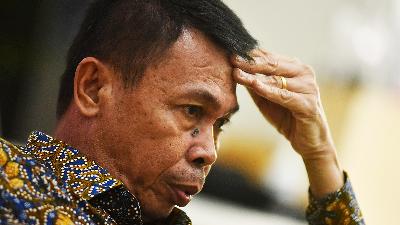
The KPK claimed to have obtained hundreds of evidence in Sahbirin Noor’s bribery case. Still waiting for investigators to formulate the case.
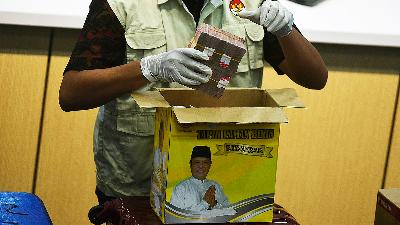
Two directors at the KPK are suspected of obstructing the designation of Sahbirin Noor as a suspect. Investigators already reported this to the commission’s leadership.
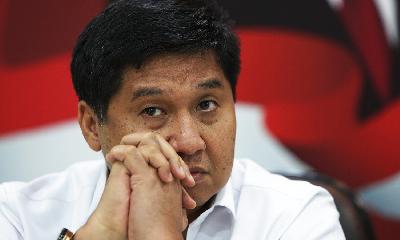
Housing and Settlement Minister Maruarar Sirait on the three million homes project, and his relationships with Jokowi and Prabowo.

The government amended the beef import regulations in order to smooth the way for the free nutritious meal program. This will have a negative effect on the management of the livestock sector.

Prabowo continued Jokowi’s methods of bringing about victory for favored candidates. This damages state institutions.

Development through the model of national strategic projects is a source of conflict and violations of human rights. One of the causes is excessive favorable treatment in the implementation of projects.
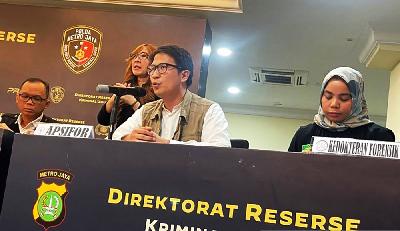
The psychologist’s take on the murder of a father and a grandmother. The perpetrator is only 14 years old.

A 14-year-old student, who killed his father and grandmother, is suspected of experiencing academic pressure from his parents and sleep deprivation.

The government is involving cooperatives and private companies in the free nutritious meal program, which they hope will bring additional capital.

The government asks businesses to assist in importing cattle for the free nutritious meal project, with import recommendation issuance becoming the leverage.

Agung Sedayu Group Chief Sugianto Kusuma alias Aguan talks about Nusantara Capital City, the national strategic projects and oligarchy.

Aguan is involved in various government flagship projects. He started out in the import business.

Under Aguan, a group of conglomerates pooled funds to develop the new capital city in a bid to attract foreign investors.
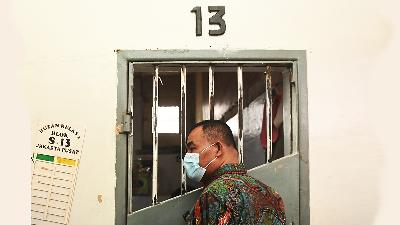
The Salemba Detention Center guards are suspected of negligence in the case of seven inmates escaping. It is alleged that someone supplied tools to the escapees.

The second season of Squid Game is coming soon. What is the point of this brutal death porn?
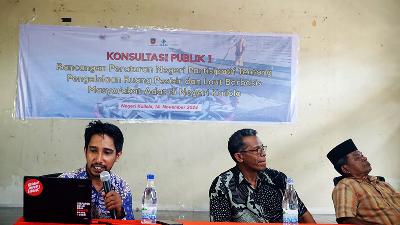
The people of Kailolo draft regulations for the enforcement of marine sasi, aimed at improving coral reefs in their area.

Amid rampant fish poaching in Indonesian waters, traditional communities in Maluku enforce sasi, a practice that protects the seas and coasts.

The Agriculture Ministry is to take over the control of food institutions and state-owned enterprises. This risks worsening the management of the food sector.

Cases of sexual violence remain high on campuses.
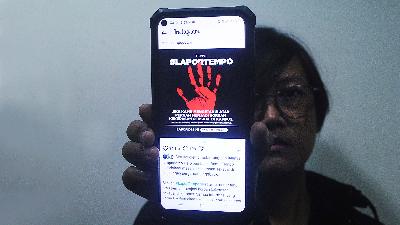
As a form of public participation, Tempo provides Lapor Tempo to accommodate reports from victims of sexual violence on campuses.

The Sexual Violence Prevention and Handling Task Force often encounters obstacles when dealing with sexual violence cases on campus. Victims feel they do not receive justice.
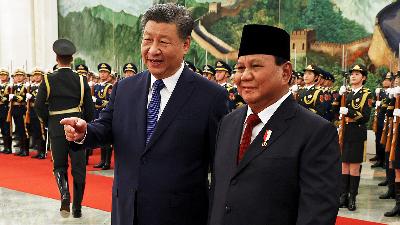
The joint statement between President Prabowo Subianto and President of China Xi Jinping on the South China Sea triggers a polemic. It weakens Indonesia’s position in the Indo-Pacific region.
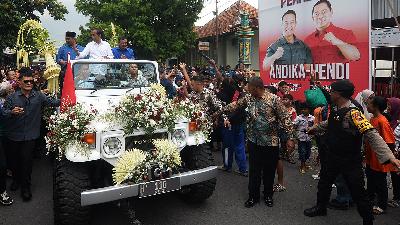
The PDI-P is wary about Jokowi and Prabowo's support for Ahmad Luthfi in the Central Java gubernatorial election. Police are suspected of pressuring business owners for support.
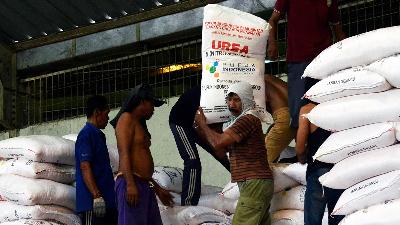
Agriculture Minister Amran Sulaiman aims to take control of state-owned enterprises in the agriculture and food sectors in an attempt to orchestrate food self-sufficiency.

Minister Amran Sulaiman recommends changes to regulations on food sector institutions, citing self-sufficiency as the primary reason.

No countercyclical stimulus is forthcoming from Bank Indonesia or the government, even as Indonesia’s economy slows. There is no new hope on the horizon.
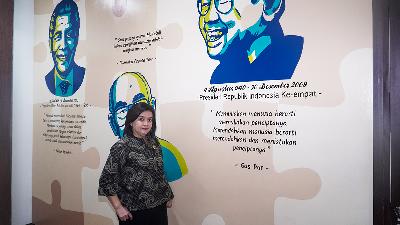
National Commission on Human Rights (Komnas HAM) Chair Atnike Nova Sigiro on human rights enforcement in the Prabowo Subianto era.

The number of people suspected of protecting online gambling sites increases to 18. Employees of the Communication and Digital Affairs Ministry are involved.
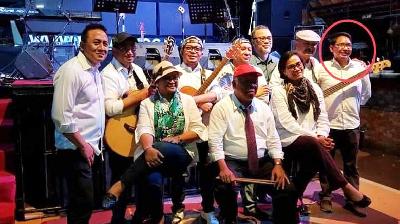
One of the suspects of the online gambling case is a regular in the ministers’ social circles, and active in the arts scene.

Former Communication and Informatics Minister Budi Arie Setiadi is implicated in an online gambling case. He allegedly met with representatives of gambling operators.

Efforts to block online gambling sites are proven futile, as many loopholes remain. Online gambling remains rampant in Jakarta.

The government’s policy of allowing MSME loans write-offs under certain conditions is deemed prone to moral hazard and misuse.

Minister of Higher Education, Science and Technology Satryo Soemantri Brodjonegoro explains BRIN’s position in the Prabowo government.
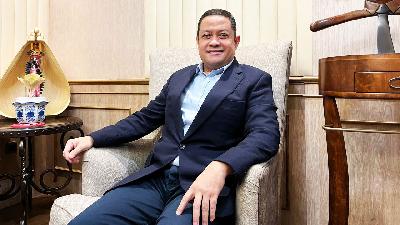
Tom Lembong’s lawyer on the irregularities of his case.

Cartoon: Yuyun Nurrachman

The Supreme Audit Agency uncovered violations in sugar import practices during various periods of the Trade Ministry. Only Tom Lembong, the Trade Minister for 2015-2016, is indicted.

The Attorney General’s Office is still withholding the evidence in the sugar import case involving Tom Lembong. State losses remain unclear.
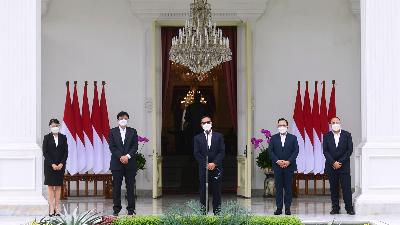
The Indonesia Investment Authority is set to merge with Danantara, but it still fails to optimize investments and faces ongoing issues with foreign investor confidence.
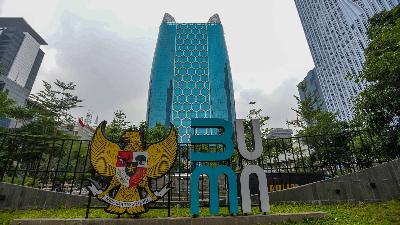
The plan for a super-holding for state-owned enterprises dates back to the New Order era. The SOEs Ministry will be replaced by a giant corporation.

Danantara will reduce the authority of the SOEs Minister. Transferring the management of major SOEs will make the Ministry almost powerless.

The move by President Prabowo Subianto to save Sritex could well lead to corruption. A smart strategy is needed to rescue collapsing companies.

The Supreme Court dismissed three judges suspected of accepting bribes in the Ronald Tannur case. This adversely impacts efforts to improve the judiciary.

Ridwan Kamil’s electability remains stagnant in the Jakarta regional head election. His supporting parties are not actively campaigning for him, leaving him hoping for support from Prabowo and Jokowi.

Prabowo Subianto orders four ministers to rescue the bankrupt textile company Sritex. A potential bailout from the state is on the table.

Prabowo Subianto is hoping to erase his sins in relation to the 1998 kidnappings. Gross human rights violations will not be a priority.
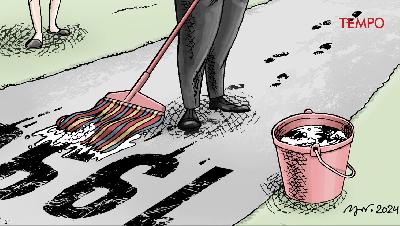
Cartoon: Yuyun Nurrachman

The increasingly overcrowded refugee camps demand improvements in the mechanisms for handling Rohingya refugees. The number of refugees continues to rise.

Several Rohingya refugees successfully built their careers in various fields. They continued to work and raised awareness about the plight of displaced Rohingya refugees.

Rohingya refugees are still living in several inadequate temporary shelters in Aceh.

There are indications of problems with the IPO of Barito Renewables Energy. The stock exchange and capital markets authorities are neglecting their responsibilities.

The KPK should designate Sahbirin Noor a fugitive. There is a good chance the South Kalimantan Governor will go free.
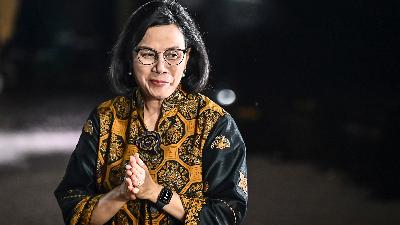
Sri Mulyani and several economic ministers from Jokowi join Prabowo’s cabinet, with encouragement from two former presidents.

South Kalimantan Governor Sahbirin Noor is suspected of receiving commissions on three projects in the e-catalog. He has not been seen since being named a suspect.

A reader’s letter suggests authorities seek ways for safe and efficient logistics transportation, in order to minimize traffic accidents.

The KPK Leadership and Supervisory Board Selection Committee claimed to have followed procedures, and Jokowi reportedly did not intervene.
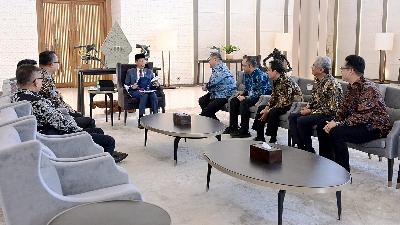
Various parties from the National Police Chief to the State Palace are accused of interfering in the KPK leadership candidates selection process. The candidates are divided into four clusters.

The KPK is investigating Taspen’s investment losses. Sinarmas is behind the transaction.

Illegal fishing and slavery continue to occur in Indonesian waters. Crew members are vulnerable to abuse.

As President Jokowi's term neared its end, instructions were given to promote the government's achievements, and billions of rupiah in contracts were offered to the media.
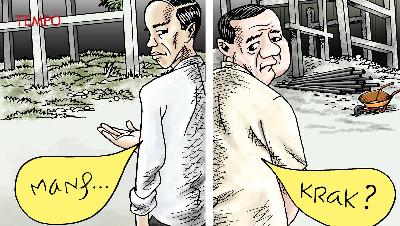
Cartoon: Yuyun Nurrachman

Officials are all trying to avoid responsibility for illegal gold mining in protected forests. The dangers to the environment and to health are being ignored.

The contest for the selection of the Supreme Court Chief Justice is heating up. There are indications it is riddled with the interests of the government and tycoons.
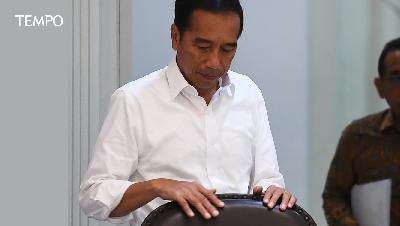
Jokowi passed a number of strategic policies at the end of his administration. Making the president-elect a hostage to fortune.
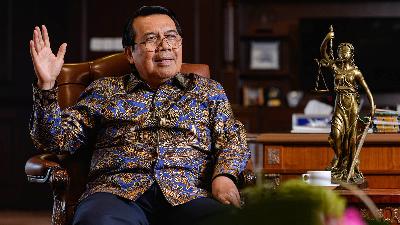
Supreme Court Chief Justice Muhammad Syarifuddin uses artificial intelligence to handle cases. Case brokers continue to be a threat.
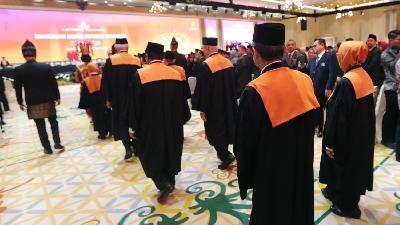
The race for the position of Chief Justice of the Supreme Court is heating up amid a flurry of allegations against certain candidates. There is suspicion of backing from business circles.

The sea sand export policy benefits financial backers close to tycoons. Also, it is a gift for Singapore.
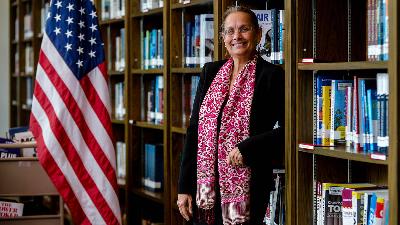
United States Ambassador Kamala Shirin Lakhdhir speaks about women, education, and Indonesia’s new administration.
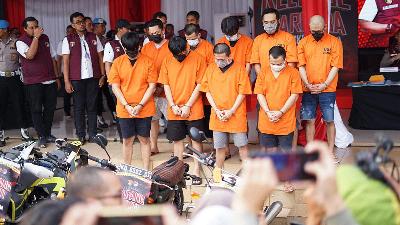
Hendra Sabarudin’s drug network distributed methamphetamine from Tarakan prison starting in 2017, allegedly aided by police and prison guards.
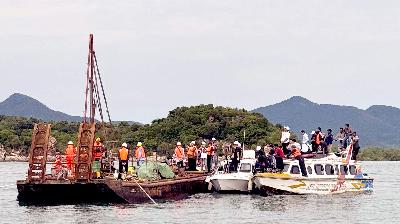
Customs has differing views from the Ministry of Maritime Affairs and Fisheries regarding sea sand export tariffs, aiming for regulations that facilitate ease.

Egianus Kogeya quietly freed Susi Air pilot Phillip Mark Mehrtens. His hope to trade the pilot for Papua’s independence failed.

The government plans to dredge 17.6 billion cubic meters of sea sand and sediment, altering the landscape and destroying marine life.

Two ministers of President Joko Widodo have paved the way for the exploitation and export of sea sand. Domestic and export interests are at odds.

The government designated a number of areas as zones for cleaning sediment and sea sand.
Independent journalism needs public support. By subscribing to Tempo, you will contribute to our ongoing efforts to produce accurate, in-depth and reliable information. We believe that you and everyone else can make all the right decisions if you receive correct and complete information. For this reason, since its establishment on March 6, 1971, Tempo has been and will always be committed to hard-hitting investigative journalism. For the public and the Republic.